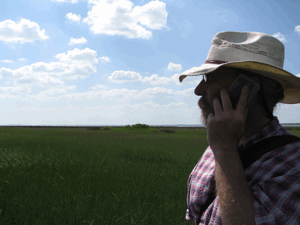An intimate tour of the threatened Gulf Coast
(Photo: Ingrid Lobet)
This story was originally reported by Living on Earth. For more, listen to the audio above.
Standing among the pitcher plants, slugs and crabs of the Grand Bay marsh, Bill Finch, conservation director for the Alabama Nature Conservancy, isn’t sure the area can survive. Before the oil from the Deepwater Horizon spill hits, Finch took “Living on Earth’s” Ingrid Lobet on a tour of what may be the fragile area’s final days.
“It’s the very worst time for an oil spill to be coming in,” according to Finch. “This whole ecosystem is really about absorbing the Gulf of Mexico this time of year, sucking it up, drawing it in. That contact with the deep ocean this time of year really regenerates this habitat. It’s this time of connectivity to the Gulf when it is at its peak.”
Oil spills happen nearly every day throughout the world, but Americans seldom see their effects so clearly. Americans have effectively outsourced the ecological cost of oil to places like Nigeria, Ecuador, and Iraq, author Peter Maass told “The World.” Maass described the effect that oil spills have on other parts of the world:
It really destroys what had been their patterns of life. There were these ecosystems that were based around fishing that have been destroyed because of oil. And as well as, also, tremendous corrupting influence that oil has had on the human political systems in these countries. But environmentally, they can’t drink the water, they can’t fish from the waters and they just basically have to depend on hand outs or whatever they can steal from the pipelines themselves, which of course causes even more environmental problems.
Americans rarely see the havoc that oil spills can cause, but it may be hitting places like the Grand Bay marsh soon. Bill Finch and the Nature Conservancy may not be able to stop that from happening, but he was determined to visit the Grand Bay marsh at least one more time. He told “Living on Earth”:
I want to see it one last time. If this is the last time I want to remember everything that was here. I hope it does break my heart. I don’t want my heart to be broken, but I’ll leave it out there for that to happen because it is important that we see this. I don’t want to forget about it.
Hosted by Steve Curwood, “Living on Earth” is an award-winning environmental news program that delves into the leading issues affecting the world we inhabit. More “Living on Earth.”
